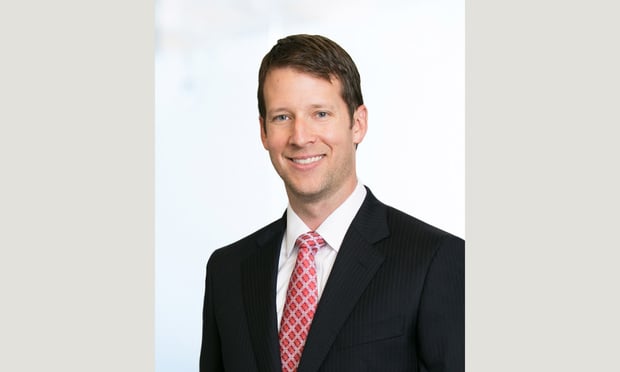Energy Industry Bankruptcies Will Accelerate in Coming Months: A Q&A With Munsch Hardt's John D. Cornwell
John D. Cornwell, a shareholder of Munsch Hardt Kopf & Harr, spoke recently with Texas Lawyer about the future of the energy industry.
June 29, 2020 at 07:19 PM
5 minute read
 John D. Cornwell, shareholder at Munsch Hardt.
John D. Cornwell, shareholder at Munsch Hardt.
John D. Cornwell is a shareholder and member of the bankruptcy, insolvency and restructuring practice group at the law firm of Munsch Hardt Kopf & Harr.
He spoke recently with Texas Lawyer about the future of the energy industry, which has been rocked recently by marketplace volatility, a foreign price war, overleveraged debt, COVID-19 and a global shift to rebuilding lower carbon economies.
Bankruptcies will no doubt accelerate over the next few months, leaving many oil and gas executives desperate to stave off the inevitable, Cornwell predicts.
Tell me about the current state of the energy industry nationally and in Texas, specifically?
John D. Cornwell: It is widely known that the combination of COVID-19 restrictions and the Saudi-Russia oil price war has had a devastating impact on the O&G industry. Companies have shut down wells; mostly ceased new exploration activities; furloughed employees, instituted wide-scale reductions-in-force, and implemented hiring freezes; and generally suffer from liquidity problems. Texas, obviously having a significant presence in the O&G industry, has been impacted disproportionately compared to other states, particularly as it relates to off-shore and high-cost exploration plays.
What does this mean for attorneys in the bankruptcy practice area?
Bankruptcy filings are up, and prevailing opinion is that the trend is only beginning. O&G-related bankruptcies represent a sizeable portion of the Chapter 11 filings in Texas, but retail bankruptcies and service-industry bankruptcies are hot on their heels. Houston, and the Southern District of Texas in particular, has become one of the hottest destinations for complex Chapter 11 filings in the nation.
First, what should energy companies do to survive this economy and what should bankruptcy attorneys be doing to position themselves to capitalize?
Cash is truly king in today's uncertain world. While commodity prices have made significant recoveries, prices still remain below generally prevailing "break-even" thresholds. COVID-19 restrictions—both relating to energy consumption and company workforce variables (and, likely in the near future, requisite insurance and litigation costs from the economic fallout)—make liquidity forecasting for troubled, but surviving companies, very difficult. And while access to new capital may still exist, the terms of such capital are materially different today than three months ago. In a word, companies should spend wisely. They should also do their homework. It is important to consider the health of contractual counter-parties. Contract terms can be modified to provide protections against bankruptcy and "avoidance action" exposure, if your counter-party ultimately files for bankruptcy. Conversely, don't be afraid to do business with bankruptcy debtors. In many instances, post-bankruptcy dealings with a reorganizing bankruptcy debtor is the most protected, certain transaction available because the Bankruptcy Code affords unique protections to persons willing to do/continue doing business with a debtor (e.g., administrative claim priority treatment; standing orders for payment of post-petition trade payables, etc.).
There is no single strategy for bankruptcy business development. Marketing success generally follows effort, particularly in this economy where demand outpaces supply. The stigma of bankruptcy is waning, but it still exists, including within the legal community and law firms. In addition to fostering relationships, assist your corporate and transactional colleagues in discussing the dreaded "B" word with their clients and contacts.
What types of bankruptcies are likely to occur in the coming months?
In short, all types. With respect to larger Chapter 11 filings, the trend has been to file "prepackaged" or pre-negotiated Chapter 11 cases, which significantly truncates a bankruptcy proceeding. For obvious reasons, more and more prospective bankruptcy debtors often have less time and resources for such filings. Accordingly, we expect to see the gamut of filings—top-level financial restructurings, full-scale restructurings with limited unsecured creditor payouts, asset sale plans, and "Subchapter V" small business filings. Of course, particularly with growing unemployment concerns, individual Chapter 7 and Chapter 13 filings are expected to maintain an upward trajectory.
What should we anticipate about the near- and long-term health of the energy industry?
This isn't the energy industries first rodeo. Unquestionably, like with every significant commodity price drop, there will be fewer surviving business when prices recover. And, with increasing alternative energies and potential consumption reduction based on electronic commerce and general work-from-home comfort, the recovery could be slower than in the past. However, most experts remain very confident that the long-term health of the industry fares well. Near-term health is, frankly, too uncertain to prognosticate. Partial oil price recovery is encouraging, and a COVID-19 vaccine would be a game-changer. But the visible road appears quite bumpy.
How do you see the energy industry, especially in Texas playing out?
Texans are energy experts, and we will remain a worldwide leader in the industry.
What does this market do for renewables?
Renewable energy market growth has been trending up for several years in a very big way, and it will continue to grow for many, many years to come. It stands to reason that some combination of commodity pricing uncertainty, growing concerns for foreign dependency (whether valid or perceived), and political pressures/changes will speed the growth. However, in a macro sense, my guess is that renewables growth is not recognizably impacted by the current economic conditions.
John D. Cornwell can be reached at [email protected].
This content has been archived. It is available through our partners, LexisNexis® and Bloomberg Law.
To view this content, please continue to their sites.
Not a Lexis Subscriber?
Subscribe Now
Not a Bloomberg Law Subscriber?
Subscribe Now
NOT FOR REPRINT
© 2025 ALM Global, LLC, All Rights Reserved. Request academic re-use from www.copyright.com. All other uses, submit a request to [email protected]. For more information visit Asset & Logo Licensing.
You Might Like
View All
Eversheds Sutherland Adds Hunton Andrews Energy Lawyer With Cross-Border Experience
3 minute read
Ex-Marathon General Counsel Takes Legal Reins of Another Energy Company

Bracewell Adds Former Pioneer Natural Resources Lawyer to O&G, Energy Transition Practices
2 minute read
ExxonMobil Sues California AG Bonta, Environmental Groups for Advanced Recycling 'Smear Campaign'
Law Firms Mentioned
Trending Stories
- 1AstraZeneca Files Flurry of Lawsuits to Protect Cancer Treatment Drug
- 2American Airlines Legal Chief Departs for Warner Bros. Discovery
- 3New Montgomery Bar President Aims to Boost Lawyer Referral Service
- 4Deadline Extended for Southeastern Legal Awards
- 5Church of Scientology Set to Depose Phila. Attorney in Sexual Abuse Case
Who Got The Work
Michael G. Bongiorno, Andrew Scott Dulberg and Elizabeth E. Driscoll from Wilmer Cutler Pickering Hale and Dorr have stepped in to represent Symbotic Inc., an A.I.-enabled technology platform that focuses on increasing supply chain efficiency, and other defendants in a pending shareholder derivative lawsuit. The case, filed Oct. 2 in Massachusetts District Court by the Brown Law Firm on behalf of Stephen Austen, accuses certain officers and directors of misleading investors in regard to Symbotic's potential for margin growth by failing to disclose that the company was not equipped to timely deploy its systems or manage expenses through project delays. The case, assigned to U.S. District Judge Nathaniel M. Gorton, is 1:24-cv-12522, Austen v. Cohen et al.
Who Got The Work
Edmund Polubinski and Marie Killmond of Davis Polk & Wardwell have entered appearances for data platform software development company MongoDB and other defendants in a pending shareholder derivative lawsuit. The action, filed Oct. 7 in New York Southern District Court by the Brown Law Firm, accuses the company's directors and/or officers of falsely expressing confidence in the company’s restructuring of its sales incentive plan and downplaying the severity of decreases in its upfront commitments. The case is 1:24-cv-07594, Roy v. Ittycheria et al.
Who Got The Work
Amy O. Bruchs and Kurt F. Ellison of Michael Best & Friedrich have entered appearances for Epic Systems Corp. in a pending employment discrimination lawsuit. The suit was filed Sept. 7 in Wisconsin Western District Court by Levine Eisberner LLC and Siri & Glimstad on behalf of a project manager who claims that he was wrongfully terminated after applying for a religious exemption to the defendant's COVID-19 vaccine mandate. The case, assigned to U.S. Magistrate Judge Anita Marie Boor, is 3:24-cv-00630, Secker, Nathan v. Epic Systems Corporation.
Who Got The Work
David X. Sullivan, Thomas J. Finn and Gregory A. Hall from McCarter & English have entered appearances for Sunrun Installation Services in a pending civil rights lawsuit. The complaint was filed Sept. 4 in Connecticut District Court by attorney Robert M. Berke on behalf of former employee George Edward Steins, who was arrested and charged with employing an unregistered home improvement salesperson. The complaint alleges that had Sunrun informed the Connecticut Department of Consumer Protection that the plaintiff's employment had ended in 2017 and that he no longer held Sunrun's home improvement contractor license, he would not have been hit with charges, which were dismissed in May 2024. The case, assigned to U.S. District Judge Jeffrey A. Meyer, is 3:24-cv-01423, Steins v. Sunrun, Inc. et al.
Who Got The Work
Greenberg Traurig shareholder Joshua L. Raskin has entered an appearance for boohoo.com UK Ltd. in a pending patent infringement lawsuit. The suit, filed Sept. 3 in Texas Eastern District Court by Rozier Hardt McDonough on behalf of Alto Dynamics, asserts five patents related to an online shopping platform. The case, assigned to U.S. District Judge Rodney Gilstrap, is 2:24-cv-00719, Alto Dynamics, LLC v. boohoo.com UK Limited.
Featured Firms
Law Offices of Gary Martin Hays & Associates, P.C.
(470) 294-1674
Law Offices of Mark E. Salomone
(857) 444-6468
Smith & Hassler
(713) 739-1250






